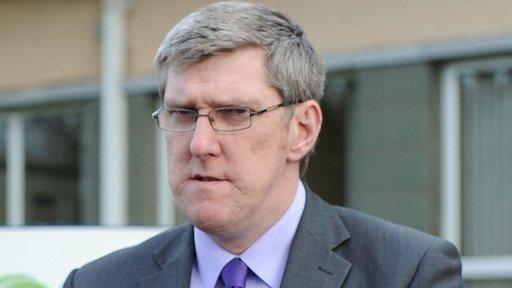Lack of teachers hampering Irish-medium secondary sector
- Published
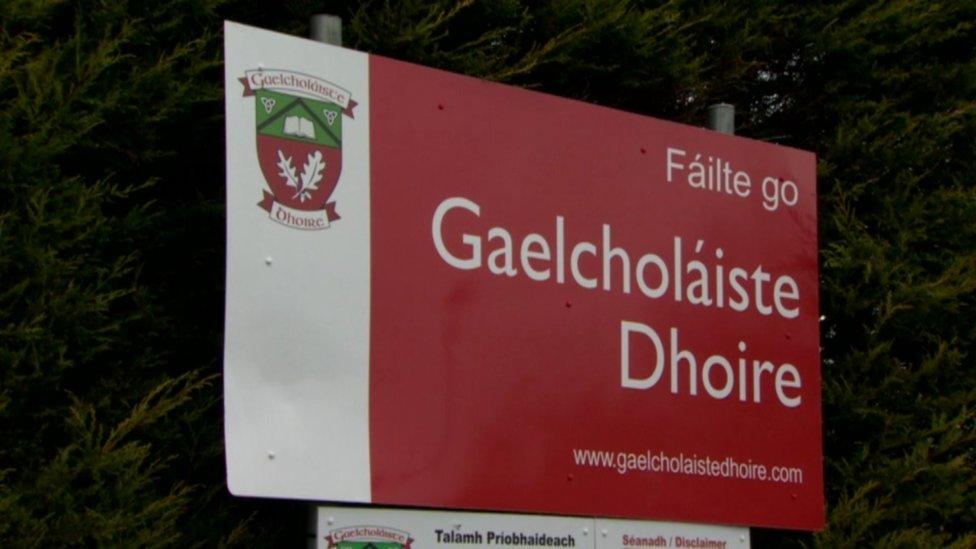
Gaelcholáiste Dhoire had only 16 pupils when it opened in 2015, but numbers have trebled
The development of Irish-medium secondary education is being hampered by a lack of suitably qualified teachers, it has been claimed.
Representatives of the sector have called on the Department of Education (DE) to develop post-primary qualifications to address the shortage.
One head-teacher has described the failure to develop such qualifications to date as a "disgrace".
There are two post-primary schools which teach through Irish.
A further three post-primary schools in Northern Ireland have Irish-medium streams.
According to the most recent DE figures, 6,200 pupils of all ages were being educated through Irish in 2017/18, a rise of 1,500 since 2012/13.
Statutory duty
As a result of the Good Friday Agreement, the DE has a statutory duty to facilitate Irish-medium education (IME).
Comhairle na Gaelscolaíochta (CnaG), the representative body for the sector in Northern Ireland, said the number of pupils in Irish-medium post primary education has been increasing at a rate of 8% per year.
"With the overall growth in demand, there is pressure for more IM post primary teachers at all levels going into the future with an immediate need for post primary teachers particularly with STEM (Science, technology, engineering, and mathematics) and other specialist subjects," said its chief executive, Liam Ó Flannagáin.
Mr Ó Flannagáin said the sector needs up to 10 new teachers in specialist subject areas this year, adding that more subjects could be offered through Irish if sufficient teachers were available.
He called on the DE and teacher training providers "to agree a strategy to increase the supply of teachers to the sector, in order to keep up with the growth in demand" in line with the department's statutory duties.
CnaG is calling for a development of a specialist Irish-medium post primary PGCE course and a post primary B.Ed course, which would enable Irish to be taken along with other specialist subjects such as maths, science, technology.
'Disgraceful' delay
The body has also called for the provision of courses to enable specialist teachers in the English-medium sector to improve their Irish skills so they can work in IME.
Mícheál Mac Giolla Gunna, head teacher of Coláiste Feirste in west Belfast - the largest Irish-medium school in Northern Ireland with about 650 pupils - said there was an urgent need to plan for the training of new teachers to meet the needs of a rapidly growing sector.
"This is particularly the case for teachers of practical subjects," said Mr Mac Giolla Gunna.
"It is disgraceful that 28 years after Coláiste Feirste opened its doors, and 10 years after DE's Review of Irish-medium Education, external highlighted teacher training and supply as a major issue, there is still no post-primary B.Ed or PGCE for Irish-medium teachers.
"DE should resource a teacher-training institution to develop and run such a course as part of a wider strategy to facilitate and support the development of Irish-medium education," he added.
Gaelcholáiste Dhoire in Dungiven has grown from 13 pupils in 2015 to an expected 180 pupils by September 2019.
Its headmaster, Diarmuid Ua Bruadair, expects the growth to continue so the school will have 500 pupils within six years.
He said the sector's rapid growth meant it was "increasingly difficult to source teachers in general and in specific subject areas in particular".
He echoed Mr Mac Giolla Gunna and CnaG's call for new courses to address the shortage.
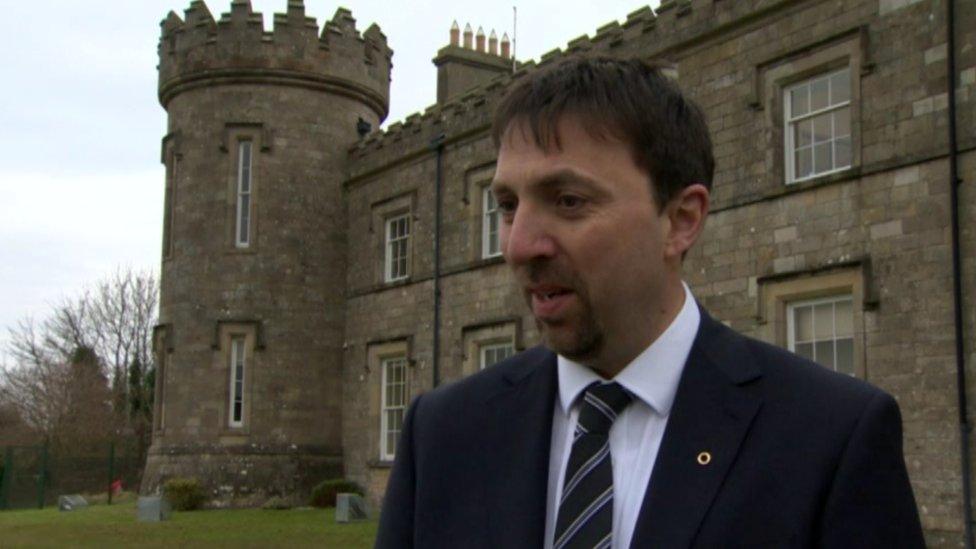
Gaelcholáiste Dhoire Principal Diarmaid Ua Bruadair said a shortage of teachers could hamper the growth of his school and the sector
The IME streams in English-medium schools with Irish-medium streams in Northern Ireland said a lack of teachers created difficulties for them, especially in the STEM (science, technology, engineering and mathematics) subjects.
Northern Ireland's teacher training providers, who have Irish language courses, all said extended provision was a matter for the DE.
Peter Finn, principal of St Mary's University College, said: "The college would certainly be open to discussions with the department if it were determined that additional provision was required.
"St Mary's has developed significant expertise in both teacher education and the production of learning materials for the Irish medium education sector and considers itself to be a centre of excellence."
'Engaging'
Ulster University pointed out that it offers a range of undergraduate programmes on its Magee campus that allow students to combine studies in one subject area with Irish language and literature.
"The Department of Education decides on courses and student allocation numbers," said a spokesperson for Queen's University Belfast.
He added that it does not offer "named subsidiary subjects" in its PGCE course.
In response to calls for more provision for the IME sector, a Department of Education spokesperson said eight PGCE Irish medium places were earmarked for the post-primary sector each year.
"The department is engaging with the IM sector regarding its concerns about the availability of IM post-primary school teachers," added the spokesperson.
- Published23 January 2019
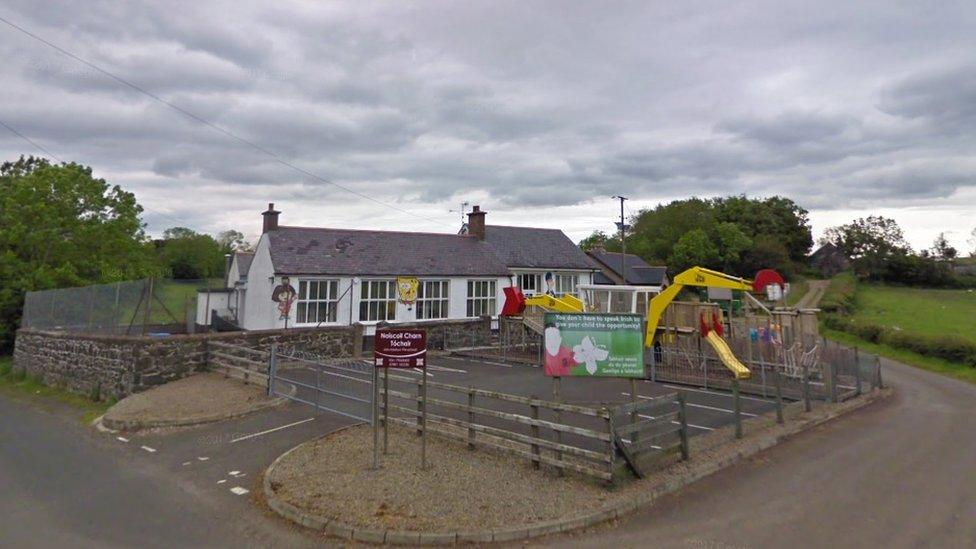
- Published19 December 2018
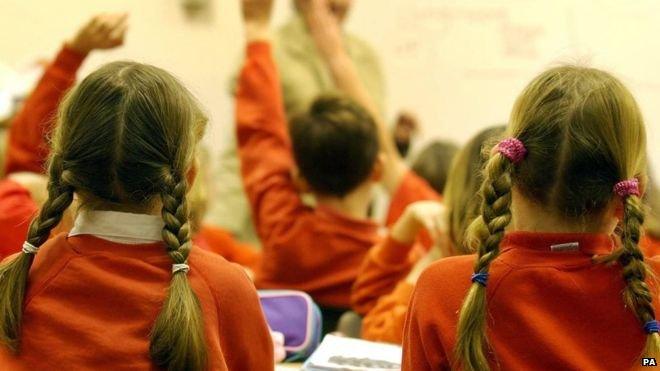
- Published22 July 2016
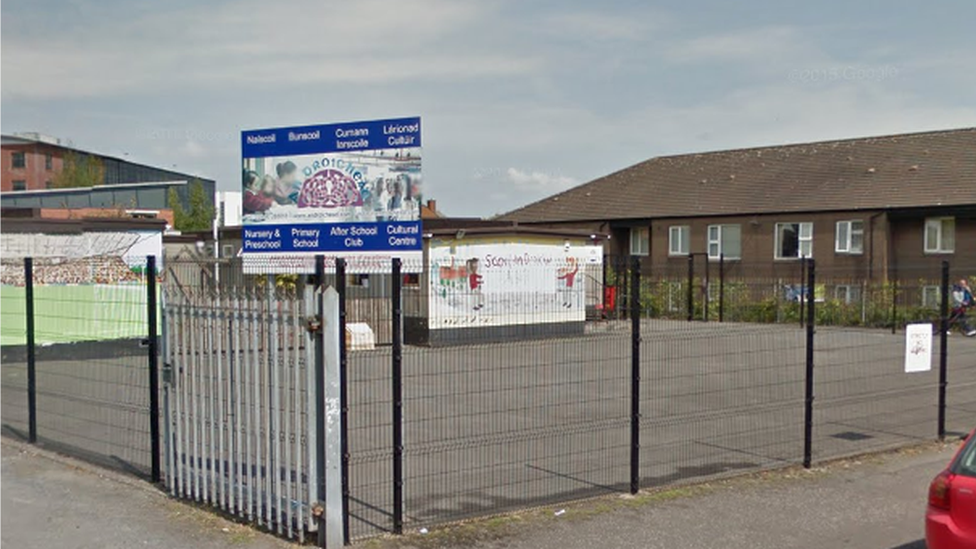
- Published10 December 2014
